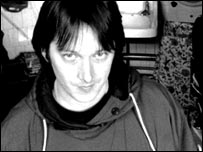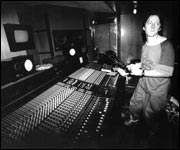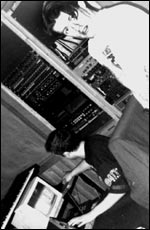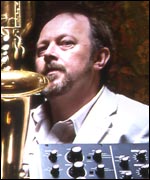| Saved from the vaults, back on the decks | |
 |
BBC Manchester 1st October 2004 Web link |
Rephlex Records have issued a collection of recordings made by 808 State between 1986 and 1988. Previously believed lost, the tunes capture the band experimenting with new sounds and developing their own acid house. Graham Massey fills in the story. Graham Massey reveals the initial inspiration behind the project to unearth 808 State's lost acid tapes was fellow Manc Sean Booth of Autechre. "We used to meet up in the Skam office," says Massey. "We ended up doing quite a few gigs together a few years ago". During this time Booth explained that he was heavily influenced by 808 State's early acid house output and asked Massey to have a dig around to see if he could find any more material recorded at the time.  Next, Aphex Twin, another big fan of 808 State's early work, got involved - so much so that he offered to release the salvaged work on his Rephlex Records label. Having re-issued Newbuild in 1998 and presided over the rescue of Stakker's seminal early acid experiments, Rephlex seemed the ideal home for the ‘new' 808 State material. As a result, the recordings are now - finally - available for the first time to the paying public. First up is a 12 inch vinyl only release of 808 State's remixes of the New Order classics, Blue Monday and Confusion. Dating back to 1988, the tunes were never intended for release but were staples of 808 State's early live gigs. "We used to do them in our set really early on because it was just something that people would recognise," says Massey. "It was kind of catering a little bit because the rest of it was so abstract." The Blue Monday remix was also used as an unofficial theme tune to Jon Da Silva's legendary Hot night which ran at the Hacienda between June and December 1988 - acid house's extended summer of love. Interestingly, Massey has mixed feelings about the release. "It's an odd one that because I do think the original is hard to mess with. You shouldn't really mess with a classic," he says. Now, nearly two decades on, it would seem that Massey's expectations are higher than they were in his youth. "If we were going to actually attempt it as a single we would have done it considerably differently," he says. "We didn't put a lot of thought into it but maybe that's its charm. Personally I wouldn't have put that out. I tried to keep that off the project but the Rephlex guys were really into it. There's other things that I'm a lot more pleased with that are really obscure album tracks and things like that where I'm like, ‘Why can't people understand that that's great?'" While from a purely musical point of view Massey may be somewhat undecided, as a piece of musical history however, the New Order remixes are reflective of a hugely important moment in time. The re-programming of the work of Mancunian royalty, New Order, and the adding of their own touches to the biggest selling 12 inch in history, reveals a young 808 State at once paying homage to the past whilst laying out a blueprint for a bold new future. More than this, the recordings also serve as a reminder of the importance of New Order to a younger generation of Manc musicians. Interestingly, Massey explains that the group was not so important for its music but for what it stood for.  "I guess New Order were influential to us in the fact that they were kind of colloquial. It was like supporting a football team," says Massey. "It was ‘local', but they had a very international outlook. That was influential in the fact that you could be from Manchester and be international. That was probably the biggest influence - to act locally and think globally. It gave us a lot of confidence." If New Order acted more as a philosophical influence then, the musical influences of the early 808 State are much more apparent in the second release from Rephlex. The album Prebuild draws together a clutch of recordings from the 1986-88 period as 808 State began experimenting with the new sounds which they heard coming out of Chicago and Detroit. Included is a live to air radio broadcast, a raw 14 minute acid work out recorded at the group's first ever live gig at the Boardwalk Club and recordings made by A Guy Called Gerald in his mum's attic. Throughout each track is the unifying sound of the Roland 303 drum machine, the sound of acid house. "In house music at the time there was a lot of cheese around," says Massey. It was the harder edge material influenced them more. "We liked things like Adonis and when all the Detroit techno stuff came out that was a heavy influence because it was a bit more leftfield I guess," he explains. The best place to hear this music at the time according to Massey was on Stu Allen's legendary Piccadily Radio show or at one of the city's clubs. Most famously, of course, the Hacienda was the key venue. Like every good Mancunian of a certain age, Massey explains that he was a regular at the club. "Me and Gerald used to be there a lot – like 3 or 4 times a week," he recalls. Massey explains that he had his own personal reasons for going to the Hacienda. "I had a get in free card because I was on Factory Records with Biting Tongues," he says. "With a get in free card and 50 pence for a Coke, that was a night out. I'd be able to walk home from there as well". Aside from the fact that it was a cheap night out, there can no denying that the club was vitally important to developing the scene and creating a breeding ground for 808 State's music. But it wasn't the only club in Manchester.  "It did split people. It did result in the rise of other clubs like The Venue, which was a few blocks up on the same street. They started having nights which were much more kind of - well - cheaper for one thing. It also resulted in other clubs like The Thunderdome, which was a very important club. There was a much harder kind of music there and it was a much scarier place to be because it was north Manchester and it had a bit of an edge." Wherever the music came into being, these new releases serve as a very useful reminder of the often forgotten fact that back in 1988, 808 State was one of the most important bands in the world. Just as importantly though, the releases have the capacity to introduce acid house music to a whole new generation. "It's interesting because I know people considerably younger than me that are out DJing are discovering acid house for the first time," says Massey. "You forget just how old that stuff is and how it can jump a generation."  For Massey, the music's power lies in its basicness. "Those records were made really fast with hardly any time to polish them or anything. But I think that what makes them really good is the immediacy and the sloppiness of them in a way." As such, the music shares much of the magic of early rock and roll. "It's simple and it works" says Massey. "You can't over complicate it". [Author: Stuart Aitken] |
|